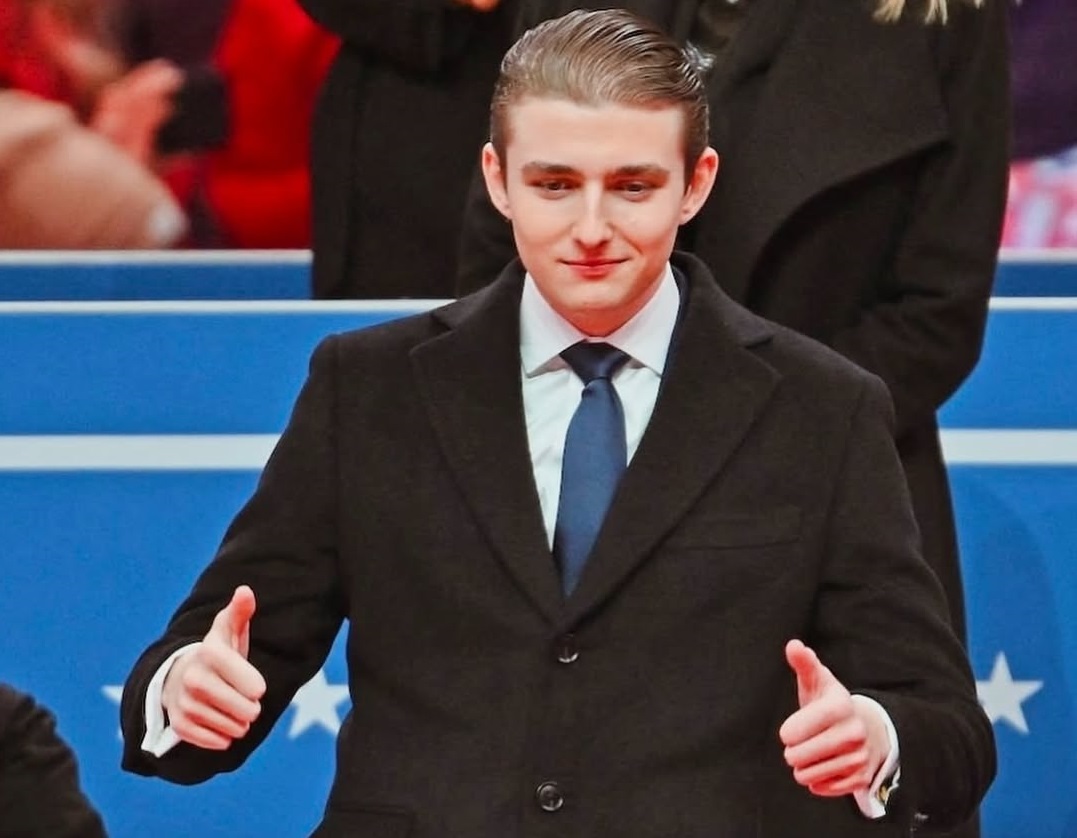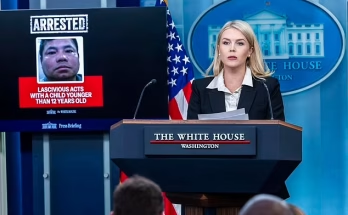And then, there are stories like this one—quiet, unplanned, and yet more powerful than anything scripted.
It was supposed to be a quick visit. A few words to the students. A walk down the familiar halls of a place that helped shape him. But what Barron Trump found in his old high school gym wasn’t just a memory—it was a moment waiting to be remembered.
And this time, the spotlight didn’t land on him.

A Visit No One Expected to Matter This Much
At 19, Barron Trump isn’t a stranger to attention—but he rarely invites it.
Now a freshman at NYU, he’s made a quiet habit of disappearing into his studies, surfacing only when necessary, rarely offering quotes, almost never giving interviews.
So when he agreed to return to his former Manhattan high school for a low-key alumni Q&A, the invitation felt routine.
No press. No motorcade. Just Barron in a gray hoodie, walking through halls he once roamed as a shy teenager with too much name recognition and not enough peace.
“Honestly, I didn’t expect anything,” one senior later said. “I thought he’d just wave, say a few things, and go.”
What stopped Barron mid-step wasn’t nostalgia. It was a familiar figure at the far end of the court—a hunched man in faded blue coveralls, quietly sweeping dust from the painted three-point line.
“Mr. Harris?” Barron called out, uncertain.
The man looked up. His posture hadn’t changed. Nor had his eyes.
“Look at you,” Mr. Harris said with a small grin. “Taller than your old man now.”
What happened next wasn’t loud. But it cracked something open in Barron—and in every student watching.
The Janitor Who Saw Through the Last Name
Years earlier, Barron had found it difficult to blend in. The attention, the assumptions, the security escorts—they all built a wall between him and the other kids. But there was one person who treated him like a boy, not a brand.
“He never once called me ‘Mr. Trump,’” Barron would later recall. “He called me ‘kiddo.’ And he talked to me like I mattered for something more than headlines.”
Mr. Harris was the one who unlocked the gym after hours when Barron needed space to clear his mind.
He was the one who wiped down the ball, kept score silently during solo drills, and gave him a single, unforgettable piece of advice:
Instead, something happened.
“Be proud of who you are—and even prouder of who you’re becoming.”
“Why Are You Still Here?”
Now, six years later, Barron stood in front of that same man—still working, now 80, still sweeping the same court.
“Why are you still here?” Barron asked, genuine confusion in his voice.
Mr. Harris smiled again, but this time slower.
“Life didn’t retire when I did,” he said. “Bills still come. My daughter’s got medical expenses. And this floor…”
He paused.
“This floor matters.”
What do you say to someone who once gave you dignity in silence—and now, in old age, keeps giving without asking?
Barron didn’t have the words.
But he did have the memory.
The Restless Night and the Unspoken Debt
That evening, Barron couldn’t sleep.
“I kept thinking about how he showed up for me when he didn’t have to,” he told a close friend. “And how I never said thank you in a way that counted.”
He began making calls.
Not to publicists. Not to donors.
To classmates. To former faculty. To a few NYU peers who believed in doing things without needing applause.
What they planned would stay quiet for as long as possible. No press releases. No hashtags.
They called it Project Courtlight—named after the lights Mr. Harris kept on late after hours.
The first recipient? Mr. Harris himself.
The Day the Gym Fell Silent—Then Erupted
Two weeks later, Mr. Harris was invited back under the pretense of attending an “alumni panel.” He nearly declined. He didn’t like attention.
He showed up in his work uniform.
What he walked into was a gym packed wall to wall with students, teachers, former grads—even cafeteria workers who hadn’t been on campus in years.
At center court stood Barron, holding a small velvet box and an envelope.
The Gym, the Dust, and the Man With the Broom
The gym hadn’t changed much.
Same polished floor. Same bleachers. Same faint smell of sweat and lemon cleaner.
You were the first man who saw me,” he said into the mic.
“And today, we want to show you that we see you.”
He opened the box. Inside was a gold-plated whistle, engraved with:
To the man who kept the doors open for dreams.
Then came the envelope: a check large enough to cover medical care for Mr. Harris’s daughter, clear his debts, and allow him to retire in dignity.
“I didn’t expect this,” Mr. Harris whispered through tears.
“Not in a thousand years.”
“That’s what makes it matter,” Barron said.
The Internet Learns the Story—Accidentally
No press had been invited.
But a blurry photo—taken by a sophomore with shaky hands—made its way to X (formerly Twitter), accompanied by the words:

